英语所有从句类型 举例
- 格式:docx
- 大小:9.65 KB
- 文档页数:2
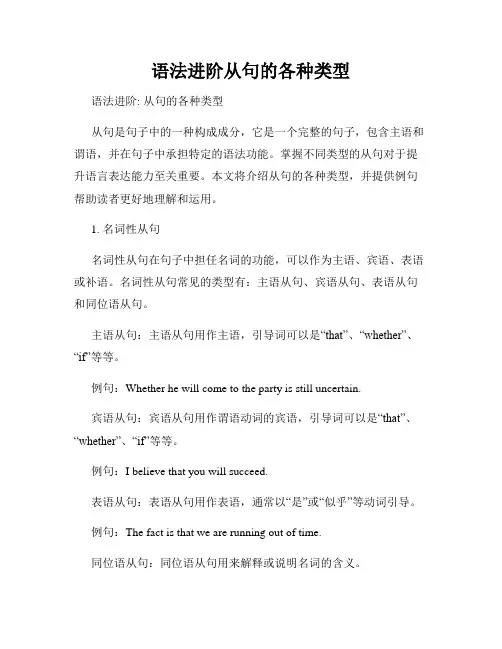
语法进阶从句的各种类型语法进阶: 从句的各种类型从句是句子中的一种构成成分,它是一个完整的句子,包含主语和谓语,并在句子中承担特定的语法功能。
掌握不同类型的从句对于提升语言表达能力至关重要。
本文将介绍从句的各种类型,并提供例句帮助读者更好地理解和运用。
1. 名词性从句名词性从句在句子中担任名词的功能,可以作为主语、宾语、表语或补语。
名词性从句常见的类型有:主语从句、宾语从句、表语从句和同位语从句。
主语从句:主语从句用作主语,引导词可以是“that”、“whether”、“if”等等。
例句:Whether he will come to the party is still uncertain.宾语从句:宾语从句用作谓语动词的宾语,引导词可以是“that”、“whether”、“if”等等。
例句:I believe that you will succeed.表语从句:表语从句用作表语,通常以“是”或“似乎”等动词引导。
例句:The fact is that we are running out of time.同位语从句:同位语从句用来解释或说明名词的含义。
例句:The news that she passed the exam made us jubilant.2. 定语从句定语从句用来修饰名词或代词,对其进行进一步的说明或限定。
常见的引导词有“that”、“which”、“who”、“whom”、“whose”等等。
例句:The book that I borrowed from the library is very interesting.3. 状语从句状语从句用来修饰动词、形容词、副词或全句,表示时间、地点、原因、条件、方式等关系。
常见的引导词有“when”、“where”、“why”、“if”、“although”等等。
例句:He went to bed after he finished his homework.4. 同位语从句同位语从句通常紧跟在某些抽象名词(如“事实”、“观点”、“信念”)后面,用来解释或说明这些名词的具体内容。
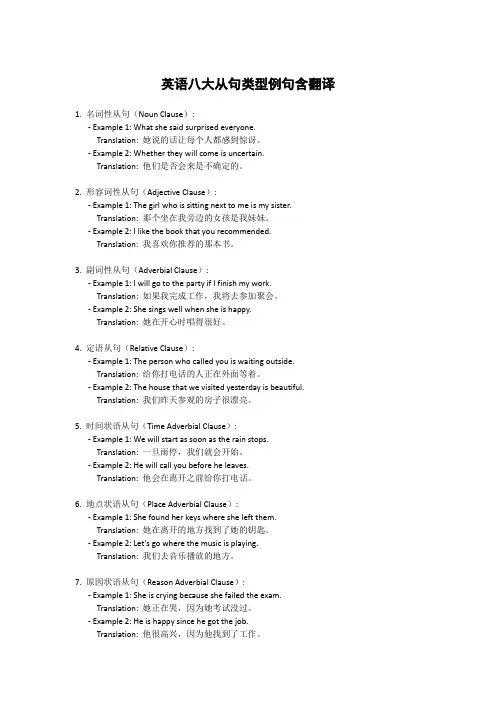
英语八大从句类型例句含翻译1. 名词性从句(Noun Clause):- Example 1: What she said surprised everyone.Translation: 她说的话让每个人都感到惊讶。
- Example 2: Whether they will come is uncertain.Translation: 他们是否会来是不确定的。
2. 形容词性从句(Adjective Clause):- Example 1: The girl who is sitting next to me is my sister.Translation: 那个坐在我旁边的女孩是我妹妹。
- Example 2: I like the book that you recommended.Translation: 我喜欢你推荐的那本书。
3. 副词性从句(Adverbial Clause):- Example 1: I will go to the party if I finish my work.Translation: 如果我完成工作,我将去参加聚会。
- Example 2: She sings well when she is happy.Translation: 她在开心时唱得很好。
4. 定语从句(Relative Clause):- Example 1: The person who called you is waiting outside.Translation: 给你打电话的人正在外面等着。
- Example 2: The house that we visited yesterday is beautiful.Translation: 我们昨天参观的房子很漂亮。
5. 时间状语从句(Time Adverbial Clause):- Example 1: We will start as soon as the rain stops.Translation: 一旦雨停,我们就会开始。
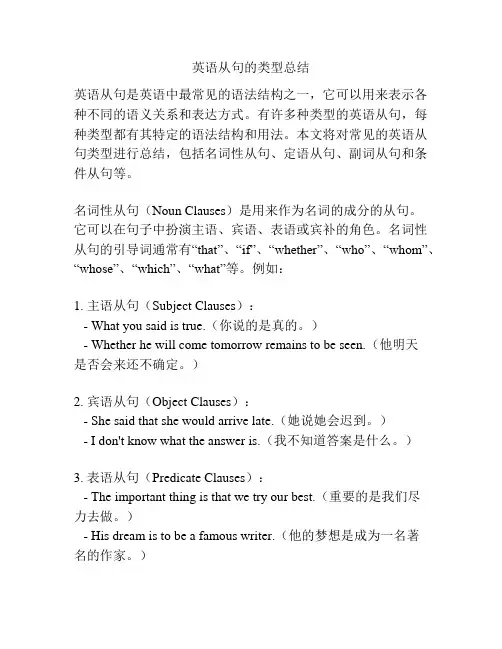
英语从句的类型总结英语从句是英语中最常见的语法结构之一,它可以用来表示各种不同的语义关系和表达方式。
有许多种类型的英语从句,每种类型都有其特定的语法结构和用法。
本文将对常见的英语从句类型进行总结,包括名词性从句、定语从句、副词从句和条件从句等。
名词性从句(Noun Clauses)是用来作为名词的成分的从句。
它可以在句子中扮演主语、宾语、表语或宾补的角色。
名词性从句的引导词通常有“that”、“if”、“whether”、“who”、“whom”、“whose”、“which”、“what”等。
例如:1. 主语从句(Subject Clauses):- What you said is true.(你说的是真的。
)- Whether he will come tomorrow remains to be seen.(他明天是否会来还不确定。
)2. 宾语从句(Object Clauses):- She said that she would arrive late.(她说她会迟到。
)- I don't know what the answer is.(我不知道答案是什么。
)3. 表语从句(Predicate Clauses):- The important thing is that we try our best.(重要的是我们尽力去做。
)- His dream is to be a famous writer.(他的梦想是成为一名著名的作家。
)4. 宾补从句(Complement Clauses):- I made a promise that I would help him.(我承诺会帮助他。
) - They declared him to be the winner.(他们宣布他是胜利者。
)定语从句(Adjective Clauses)是用来修饰名词或代词的从句。
它通常位于被修饰的名词或代词之后,并用来限定或描述该名词或代词。
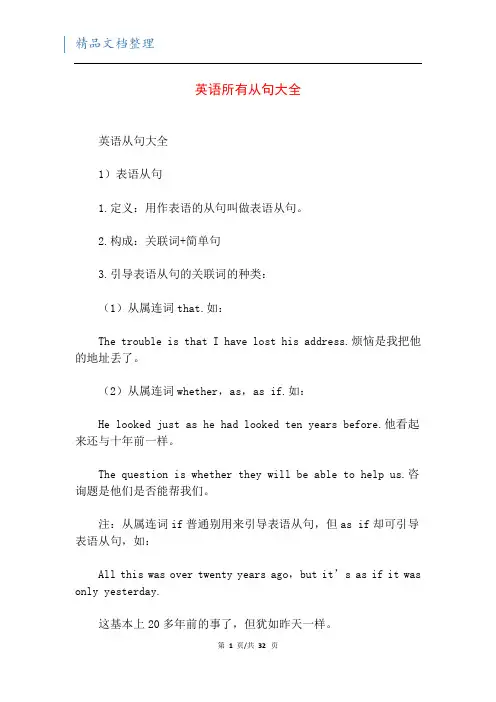
英语所有从句大全英语从句大全1)表语从句1.定义:用作表语的从句叫做表语从句。
2.构成:关联词+简单句3.引导表语从句的关联词的种类:(1)从属连词that.如:The trouble is that I have lost his address.烦恼是我把他的地址丢了。
(2)从属连词whether,as,as if.如:He looked just as he had looked ten years before.他看起来还与十年前一样。
The question is whether they will be able to help us.咨询题是他们是否能帮我们。
注:从属连词if普通别用来引导表语从句,但as if却可引导表语从句,如:All this was over twenty years ago,but it’s as if it was only yesterday.这基本上20多年前的事了,但犹如昨天一样。
能跟表语从句的谓语动词普通为系动词be,seem,look等。
如:It looked as if it was going to rain.看起来天要下雨了。
(3)连接代词who,whom,whose,what,which,whoever,whatever,whichever连接副词where,when,how,why.如:The problem is who we can get to replace her.咨询题是我们能找到谁去替换她呢。
The question is how he did it.咨询题是他是怎么做此事的。
That was what she did this morning on reaching the attic.那算是她今晨上了亭子干的。
解释:1.连词because可引导表语从句。
如:I think it is because you are doing too much.我想这是因为你做得太多。
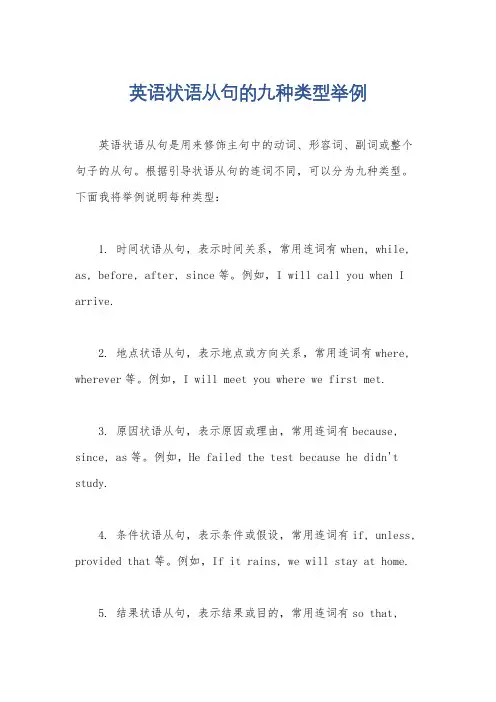
英语状语从句的九种类型举例英语状语从句是用来修饰主句中的动词、形容词、副词或整个句子的从句。
根据引导状语从句的连词不同,可以分为九种类型。
下面我将举例说明每种类型:1. 时间状语从句,表示时间关系,常用连词有when, while, as, before, after, since等。
例如,I will call you when I arrive.2. 地点状语从句,表示地点或方向关系,常用连词有where, wherever等。
例如,I will meet you where we first met.3. 原因状语从句,表示原因或理由,常用连词有because, since, as等。
例如,He failed the test because he didn't study.4. 条件状语从句,表示条件或假设,常用连词有if, unless, provided that等。
例如,If it rains, we will stay at home.5. 结果状语从句,表示结果或目的,常用连词有so that,such that等。
例如,She worked hard so that she could pass the exam.6. 方式状语从句,表示方式或方法,常用连词有as, as if, as though等。
例如,She sang as if she were a professional singer.7. 比较状语从句,表示比较关系,常用连词有than, as, as...as等。
例如,He is taller than I am.8. 让步状语从句,表示让步关系,常用连词有though, although, even if等。
例如,Although it was raining, we went out.9. 目的状语从句,表示目的或意图,常用连词有in order that, so that等。
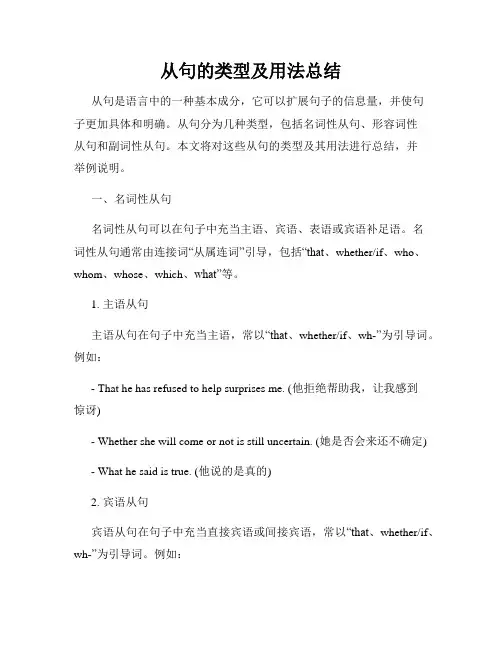
从句的类型及用法总结从句是语言中的一种基本成分,它可以扩展句子的信息量,并使句子更加具体和明确。
从句分为几种类型,包括名词性从句、形容词性从句和副词性从句。
本文将对这些从句的类型及其用法进行总结,并举例说明。
一、名词性从句名词性从句可以在句子中充当主语、宾语、表语或宾语补足语。
名词性从句通常由连接词“从属连词”引导,包括“that、whether/if、who、whom、whose、which、what”等。
1. 主语从句主语从句在句子中充当主语,常以“that、whether/if、wh-”为引导词。
例如:- That he has refused to help surprises me. (他拒绝帮助我,让我感到惊讶)- Whether she will come or not is still uncertain. (她是否会来还不确定) - What he said is true. (他说的是真的)2. 宾语从句宾语从句在句子中充当直接宾语或间接宾语,常以“that、whether/if、wh-”为引导词。
例如:- He knows that you are coming. (他知道你要来了)- I wonder if he can finish the task. (我想知道他是否能完成这个任务) - I don't know what he is talking about. (我不知道他在说什么)3. 表语从句表语从句在句子中充当表语,常以“that、whether/if、wh-”为引导词。
例如:- My wish is that you succeed. (我希望你成功)- The fact that he lied shocked everyone. (他撒谎的事实让每个人都感到震惊)4. 宾补从句宾补从句通常跟在某些动词(如“think、believe、find、consider”等)或介词(如“for、on、about”等)后面,充当宾语的补足语,常以“that、whether/if、wh-”为引导词。
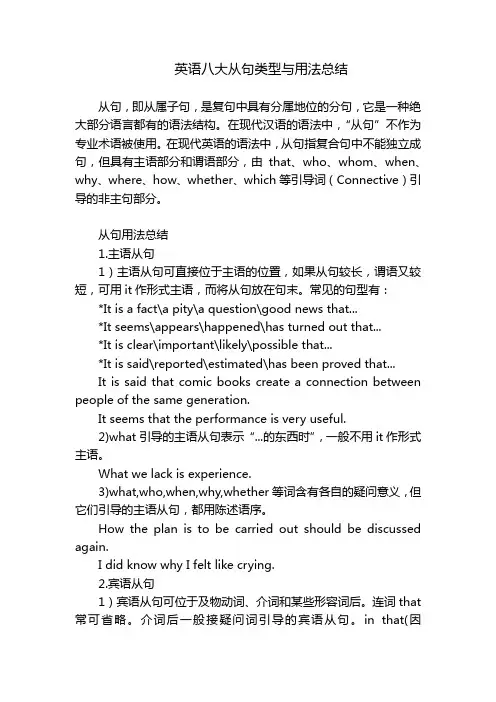
英语八大从句类型与用法总结从句,即从属子句,是复句中具有分属地位的分句,它是一种绝大部分语言都有的语法结构。
在现代汉语的语法中,“从句”不作为专业术语被使用。
在现代英语的语法中,从句指复合句中不能独立成句,但具有主语部分和谓语部分,由that、who、whom、when、why、where、how、whether、which等引导词(Connective)引导的非主句部分。
从句用法总结1.主语从句1)主语从句可直接位于主语的位置,如果从句较长,谓语又较短,可用it作形式主语,而将从句放在句末。
常见的句型有:*It is a fact\a pity\a question\good news that...*It seems\appears\happened\has turned out that...*It is clear\important\likely\possible that...*It is said\reported\estimated\has been proved that...It is said that comic books create a connection between people of the same generation.It seems that the performance is very useful.2)what引导的主语从句表示“...的东西时”,一般不用it作形式主语。
What we lack is experience.3)what,who,when,why,whether等词含有各自的疑问意义,但它们引导的主语从句,都用陈述语序。
How the plan is to be carried out should be discussed again.I did know why I felt like crying.2.宾语从句1)宾语从句可位于及物动词、介词和某些形容词后。
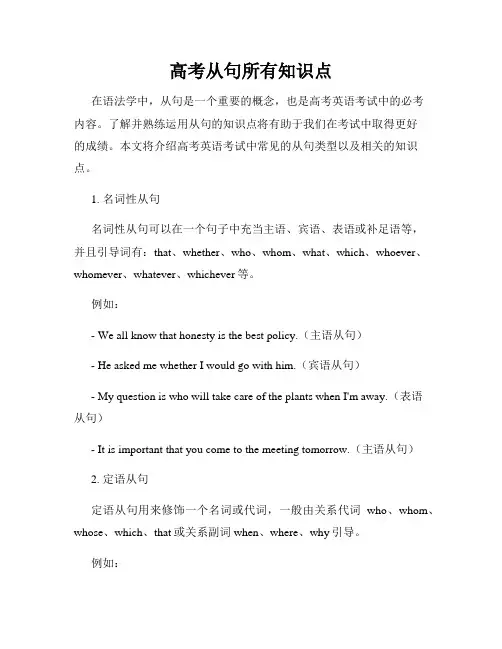
高考从句所有知识点在语法学中,从句是一个重要的概念,也是高考英语考试中的必考内容。
了解并熟练运用从句的知识点将有助于我们在考试中取得更好的成绩。
本文将介绍高考英语考试中常见的从句类型以及相关的知识点。
1. 名词性从句名词性从句可以在一个句子中充当主语、宾语、表语或补足语等,并且引导词有:that、whether、who、whom、what、which、whoever、whomever、whatever、whichever等。
例如:- We all know that honesty is the best policy.(主语从句)- He asked me whether I would go with him.(宾语从句)- My question is who will take care of the plants when I'm away.(表语从句)- It is important that you come to the meeting tomorrow.(主语从句)2. 定语从句定语从句用来修饰一个名词或代词,一般由关系代词who、whom、whose、which、that或关系副词when、where、why引导。
例如:- The girl who is playing the piano is my sister.(修饰名词)- The book that you borrowed from me is on the desk.(修饰名词)- I still remember the day when we first met.(修饰名词)- The reason why he didn't come to the party is still unknown.(修饰名词)3. 状语从句状语从句用来修饰一个动词、形容词或副词,并且主要由连词引导,包括时间状语从句、条件状语从句、原因状语从句、结果状语从句等等。
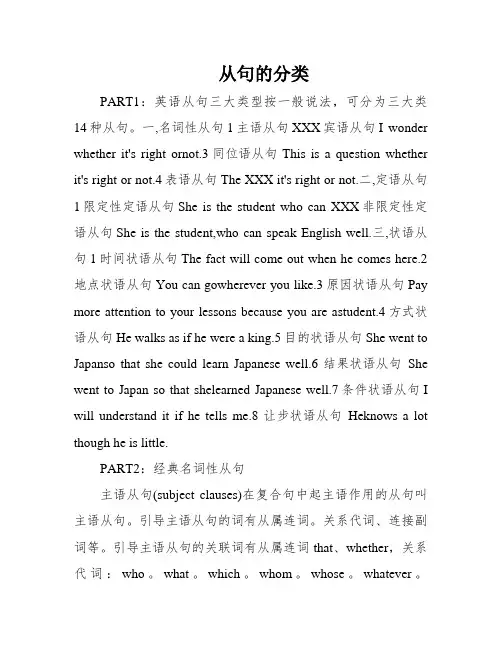
从句的分类PART1:英语从句三大类型按一般说法,可分为三大类14种从句。
一,名词性从句1主语从句XXX宾语从句I wonder whether it's right ornot.3同位语从句This is a question whether it's right or not.4表语从句The XXX it's right or not.二,定语从句1限定性定语从句She is the student who can XXX非限定性定语从句She is the student,who can speak English well.三,状语从句1时间状语从句The fact will come out when he comes here.2地点状语从句You can gowherever you like.3原因状语从句Pay more attention to your lessons because you are astudent.4方式状语从句He walks as if he were a king.5目的状语从句She went to Japanso that she could learn Japanese well.6结果状语从句She went to Japan so that shelearned Japanese well.7条件状语从句I will understand it if he tells me.8让步状语从句Heknows a lot though he is little.PART2:经典名词性从句主语从句(subject clauses)在复合句中起主语作用的从句叫主语从句。
引导主语从句的词有从属连词。
关系代词、连接副词等。
引导主语从句的关联词有从属连词that、whether,关系代词:who。
what。
which。
whom。
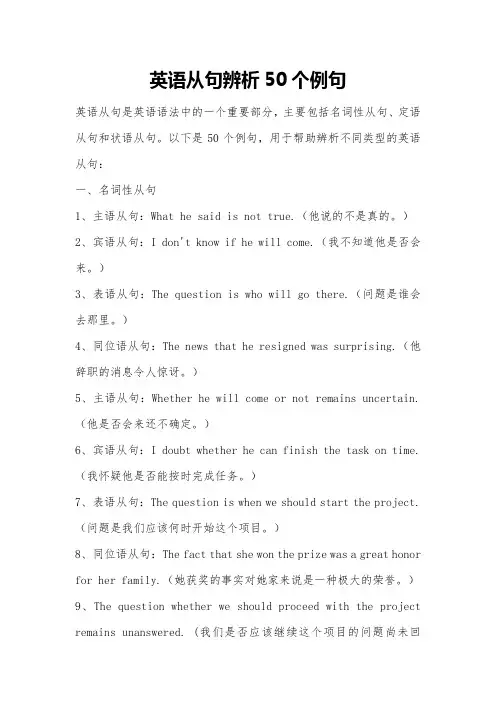
英语从句辨析50个例句英语从句是英语语法中的一个重要部分,主要包括名词性从句、定语从句和状语从句。
以下是50个例句,用于帮助辨析不同类型的英语从句:一、名词性从句1、主语从句:What he said is not true.(他说的不是真的。
)2、宾语从句:I don't know if he will come.(我不知道他是否会来。
)3、表语从句:The question is who will go there.(问题是谁会去那里。
)4、同位语从句:The news that he resigned was surprising.(他辞职的消息令人惊讶。
)5、主语从句:Whether he will come or not remains uncertain.(他是否会来还不确定。
)6、宾语从句:I doubt whether he can finish the task on time.(我怀疑他是否能按时完成任务。
)7、表语从句:The question is when we should start the project.(问题是我们应该何时开始这个项目。
)8、同位语从句:The fact that she won the prize was a great honor for her family.(她获奖的事实对她家来说是一种极大的荣誉。
)9、The question whether we should proceed with the project remains unanswered. (我们是否应该继续这个项目的问题尚未回答。
)10、It's a fact that the company is going through a tough period. (公司正在经历困难时期,这是事实。
)11、The reason why he resigned was not made public. (他辞职的原因没有公开。
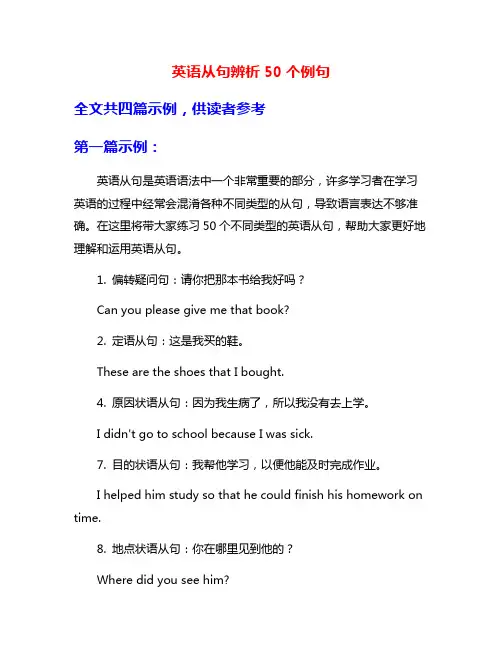
英语从句辨析50个例句全文共四篇示例,供读者参考第一篇示例:英语从句是英语语法中一个非常重要的部分,许多学习者在学习英语的过程中经常会混淆各种不同类型的从句,导致语言表达不够准确。
在这里将带大家练习50个不同类型的英语从句,帮助大家更好地理解和运用英语从句。
1. 偏转疑问句:请你把那本书给我好吗?Can you please give me that book?2. 定语从句:这是我买的鞋。
These are the shoes that I bought.4. 原因状语从句:因为我生病了,所以我没有去上学。
I didn't go to school because I was sick.7. 目的状语从句:我帮他学习,以便他能及时完成作业。
I helped him study so that he could finish his homework on time.8. 地点状语从句:你在哪里见到他的?Where did you see him?10. 比较状语从句:我比他更高。
I am taller than him.12. 主语从句:你是否知道他的名字?Do you know what his name is?16. 虚拟语气从句:如果我是你,我会努力学习。
If I were you, I would study hard.21. 结果从句:他努力学习,因此取得了很好的成绩。
He studied hard, so he got very good grades.23. 地点从句:我不知道在哪里可以买到这本书。
I don't know where to buy this book.31. 让步从句:尽管天气很冷,但他准时到达了。
Despite the cold weather, he arrived on time.34. 结果从句:他下了很多功夫,终于通过了考试。
He put in a lot of effort and finally passed the exam.45. 条件从句:如果你明天去购物,记得给我买件新衣服。
英语中的各种从句一、名词性从句1. 宾语从句- 概念- 在句子中起宾语作用的从句叫宾语从句。
它可以作谓语动词的宾语,也可以作介词的宾语等。
例如:I think (that) he is a good student.(that引导的从句作think的宾语);He is interested in what I said.(what引导的从句作介词in的宾语)- 引导词- that:无实际意义,在从句中不充当任何成分,可省略(在非正式文体中)。
例如:She said (that) she would come.- if/whether:表示“是否”,在从句中不充当成分。
例如:I don't know if/whether he will come.- 连接代词(what, who, whom, whose, which等):在从句中充当主语、宾语、表语或定语等成分。
例如:I don't know what he wants.(what在从句中作宾语);Who will be our monitor hasn't been decided yet.(who在从句中作主语)- 连接副词(when, where, why, how等):在从句中作状语。
例如:I wonder when he will arrive.(when在从句中作时间状语)- 语序- 宾语从句要用陈述语序,即“连接词+主语+谓语+其他成分”。
例如:He asked me where I was going. 而不是He asked me where was I going.- 时态- 如果主句是一般现在时,从句可以根据实际情况使用任何时态。
例如:I know that he went to Beijing yesterday.(从句用一般过去时);I know that he will come tomorrow.(从句用一般将来时)- 如果主句是一般过去时,从句要用相应的过去时态(一般过去时、过去进行时、过去将来时、过去完成时)。
英语从句类型总结1.由who引导的定语从句中,who用作主语,如:This is the boy who often helps me.2.由whom引导的定语从句中,whom用作宾语,如:The man whom you are waiting for has gone home.3.由whose引导的定语从句中,whose用作定语,如:Do you know the girl whose skirt is white?5.由that引导的定语从句中,that可以指人或物,在从句中作主语或谓语动词的宾语,但不能放在介词后面作介词宾语,如:6.由when, where, why引导的定语从句,如:I don't know the reason why he was late.This is the place where we have lived for 5 years.I'll never forget the day when I met Mr Li for the first time.注意:先行词是表示地点时,如果从句的谓语动词是及物的,就用that(which),如果从句的谓语动词是不及物的,就用where引导。
This is the house Which /that he has lived in for 15 years.(Where he has lived for 15 year.)7. 限制性定语从句和非限制性定语从句(1)限制性定语从句是句中不可缺少的组成部分,主句和从句之间不用逗号分开。
引导非限制性定语从句的关系代词有who, whom, whose, which, of which等,这些关系代词都不能省略。
(2)非限制性定语从句是对主句先行词的补充说明,没有这种从句,不影响主句意思的完整,一般用逗号把主句和从句分开,关系代词用which,不用that;指人时可用who,如:I have two brothers, who are both students.由从句担任的状语,在句子中可修饰谓语(或其它动词)、形容词、副词或是整个句子,它可以用来表示时间、地点、原因、目的、结果、条件、方式、比较、让步等。
从句有主语从句、表语从句、宾语从句、同位语从句、定语从句和状语从句6类.前四类由于主语从句、表语从句、宾语从句及同位语从句在句子的功用相当于名词,所以通称名词性从句;后两类定语从句和状语从句功用相当于形容词,称为形容词性从句.状语从句还可以分为条件状语从句、原因状语从句、方位状语从句和时间状语从句.1.主语从句(Subject Clause):用作主语的从句叫主语从句.引导主语从句的关联词有从属连词、疑问代词、疑问副词、缩合连接代词、缩合连接副词等.2.表语从句 Predicative Clause):用作表语的从句叫表语从句.引导表语从句的关联词与引导主语从句的关联词大都一样.3.宾语从句(Object Clause):在句子中起宾语作用的从句叫做宾语从句.宾语从句分为三类:动词的宾语从句,介词的宾语从句和形容词的宾语从句.第一部分一.、定义:宾语从句就是一个句子作动词或介词的宾语.二、学习宾语从句要抓住三要素:连接词、语序和时态.连接词一般都是that(指事务或人),which 指事),who 指人)1.从句为陈述句,常选择连接词that或将that省略,直接与主句相连.2.从句为一般疑问句,常选择连接词if或whether.在whether…or not结构中不能用if替换. 3.从句为特殊疑问句,常选择what,when,where,which,who,how等的疑问代、副词作连接词.★当who为主语时,句式为:who+谓语+其他判断时态情况:1.主句是一般现在时,从句为各种时态情况2.主句是一般过去时,从句为各种相应过去时态注意:从句描绘客观事实,用一般现在时3.主句是一般将来时,一般从句为一般现在时 “主将从现”)例题:〈1. The teacher told the children that the sun__B__round.A. wasB. isC. wereD. are 答案为B,属于第二种情况.宾语从句,在复合句中作宾语,位于及物动词后;Tell him which class you are in .(1)主、从句时态一致:主句谓语过去时,从句相应过去时;He answered that he was listening to me.主句谓语现在时,从句时态任所需;He says (that) he will leave a message on my desk.具体过去永不变,真理格言现在时;He told me that he was born in 1980.2)否定前移,及完成反意问句;在think / believe / suppose / guess / imagine / expect等动词后跟宾语从句否定式时,应转移到主句上去,完成反意疑问句时,应与从句主、谓保持一致.(注: 否定前移的条件是,主句主语是第一人称)I don't think you are right ,are you ?3)在表示建议suggest , advise要求demand 、desire、require、request、propose;决定decide; 命令order、command; 坚决主张insist;等动词后跟宾语从句,用 should)+v. 虚拟语气)eg.I suggested that you should)study hard.4)如果宾语从句后有宾语补足语,用it作形式宾语,把宾语从句后置eg.You may think it strange that he would live there.5)宾语从句that常可省略,但在以下情况下不能省略A.当主句谓语动词带有两个或两个以上宾语从句时,可以省略第一个that,其他不能省略. eg.I believe that)you have done your best and that things will get bet?鄄ter.B.当it作形式宾语时eg.She made it clear that she had nothing to do with him.C.当宾语从句前置时eg.That our team will win,I believe.三、分类A 、作动词的宾语:eg.I heard the newsI 主语heard 谓语动词the news.名词作宾语I主语heard 谓语动词that he would come here later on.一个句子作宾语---宾语从句B 、作介词的宾语:eg.He said nothing about this plan .He主语said 谓语动词nothing 代词作动词的宾语about 介词the plan. 名词作介词的宾语四、带有宾语从句的复合句的构成:带有宾语从句的复合句就是用连接词把一个主句和一个宾语从句连接在一起.连接词有:that(可省略),what, who, when, where, why, which, if, whether, how.五、注意:A 宾语从句必须用陈述语序.False: He is wondering when can he finish this difficult job.Right: He is wondering when he can finish this difficult job.B 有时候可以用it 作形式宾语,而把真正的宾语从句放在后面.Bad: I thought that he could finish this job in just two hours impossible.Good: I thought it impossible that he could finish this job in just two hours.Bad: He left whether we should continue this project to my judgment.Good: He left it to my judgment whether we should continue this project.C 带有宾语从句的复合句的否定形式一般是否定主句.Bad: I think he doesn’t like the English teacher.Good: I don’t think he likes the English teacher.D False: He wanted to know why he is crying in the corner.Right: He wanted to know why he was crying in the corner.4.同位语从句(Appositive Clause):与先行词同位或等同的从句叫作同位语从句.其关联词多为that.5.定语从句 Attributive Clause):用作定语的从句叫定语从句.定语从句一般皆放在被它所修饰的名 代)词之后,这种名 代)词就叫作先行词 Antecedent).引导定语从句的关联词为关系代词(或称引导词、关系词等).关系代词在定语从句中可用作主语、宾语、定语等;关系副词在定语从句中用作状语.①引导定语从句的关联词有who, whom, whose, that, when, where, why 和which. 在非限制定语从句中, 只可用which, who, whose, where , when., 如果指代前面整个句子, 多用which.例句:The dog that/which was lost has been found. 失踪的狗已经找到了.)③as 可做引导词引导定语从句, 多和such, the same 连用. As 引导的定语从句也可修饰整个句子, 既可放在先行词后,也可放在句子开头.例句:Such people as you describe are rare nowadays. 你描述的那一类人现在很少了.)④介词+which/whom/whose从句The driver is the man from whose room she had stolen the gold watch. 她就是从那个司机的房间偷了金表的.)⑤代/名+介词+which 从句He is needing a book, the name of which I don't know.( 他需要一本书,但是我不知道书名.)⑥同位语从句和定语从句The news that you told me was really exciting. 你告诉我的好个消息真的是很激动人心.)⑦难句:NO.1He is one of the men who were chosen to represent the group. 他是被选为代表该团队的人中一员.)第二部分一、时态1·主句用一般现在时,从句可用任意时态.2·主句用过去时,从句用过去某个时态.3·主句用过去时,从句是真理时,只用一般现在时.二、宾语从句的几类连接词:①从属连词连接宾语从句的从属连词主要有that,if,whether. that引导表示陈述句的宾语从句,而if和whether引导表示“是否”的宾语从句.例句:I don’t know if there will be a bus any more.我不知道是否还会有公交车.②连接代词连接代词主要有who, whom ,whose ,what ,whoever ,whomever ,whosever, whatever, whichever等.连接代词一般指疑问,但what, whatever除了指疑问外,也可以指陈述.例句:Do you know who has won Red Alert game?你知道谁赢了这一局红警游戏吗?③连接副词连接副词主要有when,where,why,how,whenever,wherever,however等.例句:He didn’t tell me when we should meet again.他没有告诉我什么时候我们能再见面.三、动词的宾语从句大多数动词都可以带宾语从句We all expect that they will win , for members of their team are stronger.我们都预料他们会赢,因为他们的队员更强壮.★部分“动词+副词”结构也可以带宾语从句例句:I have found out that all the tickets for the concert have been sold out.我发现这场音乐会的所有票都卖光了.★动词短语也可以带宾语从句常见的这些词有:make sure确保make up one’s mind下决心keep in mind牢记例句:Make sure that there are no mistakes in your papers before you turn them in.在上交试卷前确保没有任何错误.四、可运用形式宾语it代替的宾语从句①动词find,feel,consider,make,believe等后面有宾语补足语的时候,则需要用it做形式宾语而将that宾语从句后置.例句:I think it necessary that we take plenty of hot water every day .我认为每天多喝开水是有必要的.②有些动词带宾语从句时寻要在宾语与从句前加it这类动词主要有:hate, take , owe, have, see to.例句:I hate it when they with their mouths full of food.我讨厌他们满嘴食物时说话.③若宾语从句是wh-类,则不可用it代替例句:We all consider what you said to be unbelievable.我们都认为你所说的是不可信的.五、介词的宾语从句用wh-类的介词宾语从句例句:We are talking about whether we admit students into our club.我们正在讨论是否让学生加入我们的俱乐部.★用that,if引导的介词宾语从句有时候except,but,besides三个介词后可见到that引导的宾语从句例句:I know nothing about my new neighbor except that he used to work with a company.对于我的新邻居我只知道他曾在一家公司上班,其他一无所知.六、形容词的宾语从句常用来引导宾语从句的形容词有:sure,certain,glad,please,happy,sorry,afraid,satisfied,surprised例句:I am sure I will pass the exam.我确信我会通过考试.七、if,whether在宾语从句中的区别①if和whether在作“是否”解时,引导宾语从句常放在动词know,ask,care,wonder,find out等之后,介词后一般不用if②少数动词,如:leave,put,discuss,doubt后的宾语从句常用whether.③whether后可以加or not,但是if不可以.④在不定式前只能用whether.如:I can’t decide whether to stay. 我不能决定是否留下.⑤避免歧异时,我们常用whether而不用if.八、哪些宾语从句不可以省略引导词that1.当that作learn,suggest,explain,agree,wonder,prove,mean,state,feel,hold等动词的宾语时;2.当宾语从句较长时;3.当主语状语置于主句尾,宾语从句之前时;4.当主语谓语动词(包括非谓语动词)与宾语从句之间有插入语时;5.当一个动词带有两个或两个以上宾语从句时,此时第一个that可以省略,第二个that不可以省略;6.当宾语从句中的主语是this,that或this,that做主语的定语时;7.当宾语从句是双宾语中的直接宾语时;8.当宾语从句的主语是非谓语动词或主语从句时;9.当主语中的谓语动词是固定词组时;10.当宾语从句有it做其先行词时;11.在直接引语中,转述分句把宾语从句隔开时.九、宾语从句的否定转移主句的谓语动词是think,believe,imagine,suppose,consider,espect,fancy,guess等,并且主句的主语是第一人称而且为一般现在时,从句的否定词一般要转移到主句上来,其反义疑问句一般与宾语从句一致.例句:I don’t think he will come to my party.而不能说成I think he won’t come to my party.我认为他不会来我的舞会.★如果宾语从句中有某个含有否定意义的形容词或副词,其反义疑问句要用肯定形式.例句:We find that he never listens to the teacher carefully,does he?我们发现他从来不仔细听老师讲课,是不是?十、宾语从句的时态和语序当主句为现在时或将来时的时候,宾语从句的时态一般不受主句的时态所影响.当主句为过去时的时,细分为一下几种情况:①从句用一般过去时或过去进行时表示与主句谓语动词动作同时发生例句:I only knew he was studying in a western country,but I didn’t know what country he was in.我只知道他当时在西方的一个国家读书,可不知道是哪个国家.②从句过去完成时表示该动作发生在主句谓语动作之前例句:He told me that he had told Mary about the meeting already.他告诉我他已经把有关会议的事情告诉的了Mary.③从句谓语用过去将来时表示该动作发生在主句谓语动作之后例句:The reporter asked if the government would take necessary measures to put down the to-do.记者问政府是否会采取必要的措施镇压骚乱.★如果从句是一个客观真理,那么从句的时候不根据主句的时态而变化例句:The teacher said that the moon goes around the earth yesterday.老师昨天说月亮绕着地球转.★当宾语从句的引导词是who,which,what,when,where,how,why等表疑问时,不能按正常语序安排,经常将这类引导词置于句首例句:Who do you think the public might choose as their favorite singer this year?你认为今年公众会选谁为他们最喜欢的歌手.同位语从句用法比较"固定",把关键的几个词背下来 下面这个材料供参考):一、在复合句中用作同位语的从句叫同位语从句.它一般跟在某些名词后面,用以说明该名词表示的具体内容.如:I had no idea that you were here.我不知道你在这里.二、可以跟同位语从句的名词通常有news,idea,fact,promise,question,doubt,thought,hope,message,suggestion,words消息),possibility等.如:I’ve come from Mr wang with a message that he won’t be able to see you this afternoon.我从王先生那里来,他让我告诉你他今天下午不能来看你了.三、英语中引导同位语从句的词通有连词that,whether,连接副词how,when,where等.( 注:if,which 不能引导同位语从句.)如:l have no idea When he will be back.我不知道他什么时候回来.四、有时同位语从句可以不紧跟在说明的名词后面,而被别的词隔开. 如:The thought came to him that maybe the enemy had fled the city.他突然想起可能敌人已经逃出城了.五、同位语从句与定语从句的区别.1、同位语从句与前面的名词是同位关系,即说明它前面名词的内容;而定语从句与前面的名词是修饰与被修饰关系,即限定它前面的名词范围,或补充一些情况.如:The news that l have passed the exam is true.我通过了考试这一消息是真的.同位语从句,即从句所表达的意思就是前面名词的内容.)The news that he told me just now is true.他刚才告诉我的消息是真的.定语从句,从句对前面名词起修饰限制作用,即“他告诉我的”那个消息,而不是别的消息.)2、引导同位语从句的that是连词,在从句中不充当任何成份,而引导定语从句的that是关系代词,除起连接作用外,还在从句中充当主语、宾语或表语等.如:The idea that computers can recognize human voices surprises many people.计算机能够识别人的声音的想法使许多人感到惊奇.that在从句中不充当任何成份.)一个名词(或其它形式)对另一个名词或代词进行修饰,限定或说明,这个名词(或其它形式)就是同位语.同位语与被它限定的词的格要一致,并常常紧挨在一起.1) 非独立的同位语:常出现在被限定词前Bruce Lee (姓名) 李小龙Graf Schmidt (称号,浑名) 施密特伯爵Doktor Wang (职称,头衔) 王博士Uncel Liu (亲戚的称呼) 刘叔叔die Stadt Shanghai (类属名称) 上海市the Province Hebei (类属名称) 河北省das Jahr 2000 (类属名称) 2000 年three Kilo tomato (度量名称) 三公斤西红柿the University Bremen (专有名词) 不来梅大学。
各种从句的英文表达1、主语从句主语从句就是作主语的从句。
它的连接词有连词、连接副词、连词代词。
主语从句放在句首时,句子显得很笨重,因此常用it作形式主语,而将真正的主语后置,比如:It is a pity that you have missed such a wonderful concert.真遗憾你错过了这么精彩的一场音乐会。
2、表语从句表语从句就是作表语的从句。
它的连接词有连词、连接副词、连词代词等。
比如:My idea is that we meet at the bus stop.我的想法是我们在公共汽车站会面。
3、宾语从句宾语从句就是作宾语的从句。
它的连接词有连词、连接副词、连词代词等。
比如:She said that she would drop maths.她说她要放弃数学。
4、同位语从句同位语从句就是作同位语的从句,它的连接词有连词、连接副词等。
The fact that everyone loves beauty is common sense.人人爱美是常识。
5、定语从句定语从句就是作定语的从句。
定语从句主要修饰、限定、描绘名词,有时修饰代词,放所修饰词后边。
比如:The girl who wears a new dress is my daughter.那个穿新衣服的女孩是我的女儿。
6、状语从句状语从句就是作状语的从句。
在复合句中修饰主句中的谓语动词、形容词或副词,起状语作用的从句叫作状语从句。
比如:Soon after he jumps his parachute will open.他跳伞之后,降落伞就会打开。
从句的类型及引导词总结从句是一种在句子中起到特定功能的句子成分。
它可以作为主句的主语、宾语、定语或状语,起到丰富句子意义和提供更多信息的作用。
从句根据功能和结构可以分为名词性从句、形容词性从句和副词性从句,而引导从句的词语则根据从句的类型来确定。
下面将对这些从句类型及其引导词进行总结。
一、名词性从句名词性从句在句子中扮演名词的角色,可以作为主语、宾语、表语或同位语。
常见的名词性从句有主语从句、宾语从句、表语从句和同位语从句。
1. 主语从句:从句作为整个句子的主语,通常以从属连词"that"引导。
例如:- What he said is true.(他说的是真的。
)- That he is late is unacceptable.(他迟到是不可接受的。
)2. 宾语从句:从句作为句子中的宾语,可以由多个引导词引导,如"that"、"if"、"whether"、"who"、"what"等。
例如:- I don't know if he will come.(我不知道他是否会来。
)- She asked me what my favorite color is.(她问我最喜欢的颜色是什么。
)3. 表语从句:从句作为句子中的表语,通常以从属连词"that"引导。
例如:- The fact is that he lied to us.(事实是他对我们撒了谎。
)- My dream is that I can travel around the world.(我的梦想是能环游世界。
)4. 同位语从句:从句作为另一个名词或代词的同位语,通常以从属连词"that"或连接代词/连接副词引导。
例如:- The news that she won the first prize was exciting.(她赢得一等奖的消息令人激动。
英语语法: 英语从句完全汇总一.主语从句主语从句是在复合句中充当主语的从句,通常放在主句谓语动词之前或由形式主语it 代替,而本身放在句子末尾。
1. It 作形式主语和it引导强调句的比较It 作形式主语代替主语从句,主要是为了平衡句子结构,主语从句的连接词没有变化。
而it引导的强调句则是对句子某一部分进行强调,无论强调的是什么成分,都可用连词that。
被强调部分指人是也可用who/whom。
例如:It is a pity that you didn’t go to see the film.It doesn’t interest me whether you succeed or not.It is in the morning that the murder took place.It is John that broke the window.2. 用it 作形式主语的结构(1) It is +名词+从句It is a fact that …事实是…It is an honor that …非常荣幸It is common knowledge that …是常识(2) it is +形容词+从句It is natural that…很自然…It is strange that…奇怪的是…(3) it is +不及物动词+从句It seems that…似乎…It happened that…碰巧…(4) it +过去分词+从句It is reported that…据报道…It has been proved that…已证实…3. 主语从句不可位于句首的五种情况(1) if 引导的主语从句不可居于复合句句首。
(2) It is said , (reported) …结构中的主语从句不可提前。
例如:It is said that President Jingo will visit our school next week. (right)That President Jiang will visit our school next week is said. (wrong)(3) It happens…, It occurs…结构中的主语从句不可提前。
在英语中,主要有三大从句
名词性从句(包括主语从句,宾语从句,表语从句,同位语从句)、
形容词性从句(即定语从句)、
副词性从句(即状语从句,包括时间、条件、结果、目的、原因、让步、地点、方式等)。
主语从句:用作主语
eg:Whoever comes is welcome. 不论谁来都欢迎。
宾语从句:用作宾语
eg:Do you know where he lives? 你知道他住在哪吗?
表语从句:用作表语用来说明主语的身份、特征、状态等。
eg:My opinion is that you should work hard. 我的意见是你应该努力工作。
同位语从句:用于解释说明前面的名词
eg:The news that you got the first place is true.你获得了第一名的消息是真的
(that从句用于解释说明the news)
定语从句:相当于一个形容词,用于修饰前面的名词
eg:The student who answered the question was sandy. 回答问题的学生是sandy.
状语从句:相当于一个副词
eg:When it rains, I usually go to school by bus. 天下雨时,我通常坐公共汽车上学。
(时间状语)
If he comes tomorrow, you will see him. 如果他明天来,你就可以看到他了。
(条件状语)
(if 引导的条件状语从句,其结构为:if +状语从句,+主句)。
要注意在状语从句中有一个规则是“主将从现”,即主句是将来时,则从句要用一般现在时表示将来。